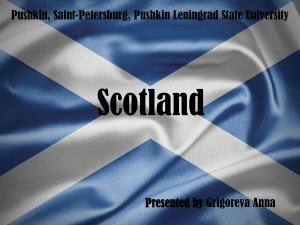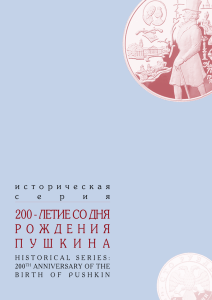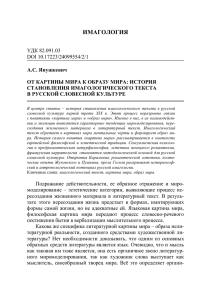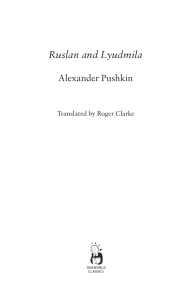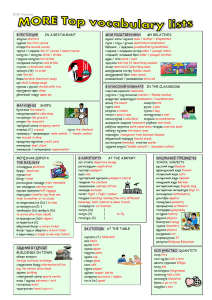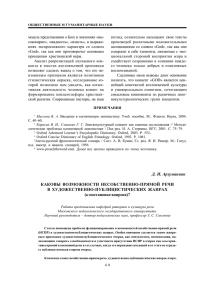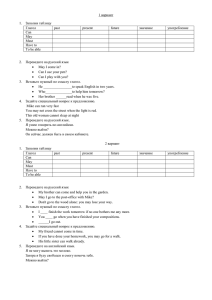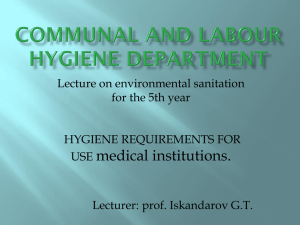UNIVERSITY OF PITTSBURGH Department of Slavic Languages
реклама
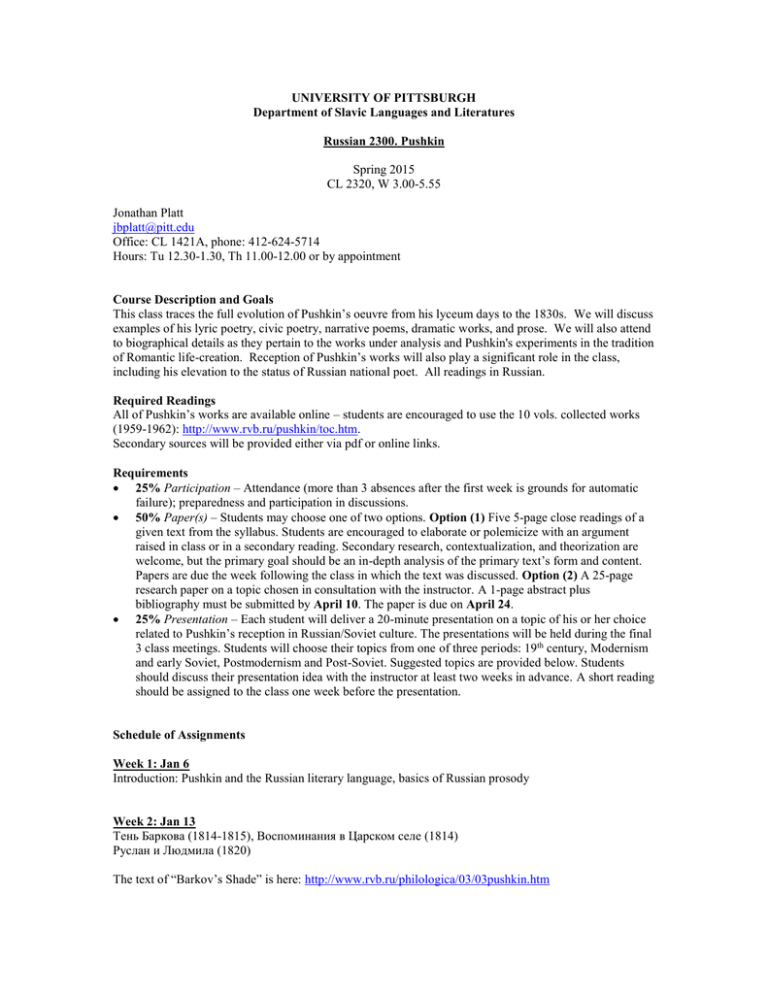
UNIVERSITY OF PITTSBURGH Department of Slavic Languages and Literatures Russian 2300. Pushkin Spring 2015 CL 2320, W 3.00-5.55 Jonathan Platt [email protected] Office: CL 1421A, phone: 412-624-5714 Hours: Tu 12.30-1.30, Th 11.00-12.00 or by appointment Course Description and Goals This class traces the full evolution of Pushkin’s oeuvre from his lyceum days to the 1830s. We will discuss examples of his lyric poetry, civic poetry, narrative poems, dramatic works, and prose. We will also attend to biographical details as they pertain to the works under analysis and Pushkin's experiments in the tradition of Romantic life-creation. Reception of Pushkin’s works will also play a significant role in the class, including his elevation to the status of Russian national poet. All readings in Russian. Required Readings All of Pushkin’s works are available online – students are encouraged to use the 10 vols. collected works (1959-1962): http://www.rvb.ru/pushkin/toc.htm. Secondary sources will be provided either via pdf or online links. Requirements 25% Participation – Attendance (more than 3 absences after the first week is grounds for automatic failure); preparedness and participation in discussions. 50% Paper(s) – Students may choose one of two options. Option (1) Five 5-page close readings of a given text from the syllabus. Students are encouraged to elaborate or polemicize with an argument raised in class or in a secondary reading. Secondary research, contextualization, and theorization are welcome, but the primary goal should be an in-depth analysis of the primary text’s form and content. Papers are due the week following the class in which the text was discussed. Option (2) A 25-page research paper on a topic chosen in consultation with the instructor. A 1-page abstract plus bibliography must be submitted by April 10. The paper is due on April 24. 25% Presentation – Each student will deliver a 20-minute presentation on a topic of his or her choice related to Pushkin’s reception in Russian/Soviet culture. The presentations will be held during the final 3 class meetings. Students will choose their topics from one of three periods: 19th century, Modernism and early Soviet, Postmodernism and Post-Soviet. Suggested topics are provided below. Students should discuss their presentation idea with the instructor at least two weeks in advance. A short reading should be assigned to the class one week before the presentation. Schedule of Assignments Week 1: Jan 6 Introduction: Pushkin and the Russian literary language, basics of Russian prosody Week 2: Jan 13 Тень Баркова (1814-1815), Воспоминания в Царском селе (1814) Руслан и Людмила (1820) The text of “Barkov’s Shade” is here: http://www.rvb.ru/philologica/03/03pushkin.htm Recommended secondary texts: Alyssa Gillespie. “Bawdy and Soul: Pushkin’s Poetics of Obscenity.” Олег Проскурин. Поэзия Пушкина, или подвижный палимпсест. Глава 1. Week 3: Jan 20 Дорида (1820), Гроб юноши (1821), К Овидию (1821), Гречанке (1822), Простишь ли мне ревнивые мечты… (1823), Прозерпина (1824), К морю (1824) Гавриилиада (1821) Recommended secondary texts: Борис Гаспаров. Поэтический язык Пушкина. Часть 2, глава 4. Вадим Вацуро. К истории элегии «Простишь ли мне ревнивые мечты…». Andrew Kahn. “The Blasphemies of the Gabrieliad.” Week 4: Jan 27 Бахчисарайский фонтан (1823) Цыганы (1824) Recommended secondary texts: Monika Greenleaf. Pushkin and Romantic Fashion. Chapter 3. Katya Hokanson. “Pushkin’s Captive Crimea.” Юрий Манн. Поэтика русского романтизма. Week 5: Feb 3 Борис Годунов (1825/31) Вольность (1817), К Чаадаеву (1818), Кинжал (1821), В.Л. Давыдову (1821), К Языкову (1824), Андре Шенье (1825), Анчар (1828) Recommended secondary texts: Monika Greenleaf. Pushkin and Romantic Fashion. Chapter 4. Борис Гаспаров. Поэтический язык Пушкина. Часть 2, глава 3. Jonathan Platt. “Where is Liberty and Law?” Week 6: Feb 10 Евгений Онегин, Отрывки из путешествия Онегина (1823-1830) Recommended secondary texts: Юрий Лотман. Роман в стихах «Евгений Онегин». Главы 1-4. Юрий Чумаков. Поэтика «Евгения Онегина». William Mills Todd. “Eugene Onegin: ‘Life’s Novel’.” Monika Greenleaf. Pushkin and Romantic Fashion. Chapter 5. Week 7: Feb 17 Разговор книгопродавца с поэтом (1824), Пророк (1826), Поэт (1827), Арион (1827), Поэт и толпа (1828), Поэту (1830), В начале жизни школу помню я… (1830) Повести покойного Ивана Петровича Белкина (1830) Recommended secondary texts: Борис Гаспаров. Поэтический язык Пушкина. Часть 3, глава 1. Harsha Ram. The Imperial Sublime. P. 142-46, 160-76 Вольф Шмид. Проза Пушкина в поэтическом прочтении. Часть 2. David Bethea and Sergei Davydov. “Pushkin’s Saturnine Cupid.” Week 8: Feb 24 Под небом голубым страны своей родной… (1825), Как счастлив я, когда могу покинуть… (1826), Заклинание (1830), Для берегов отчизны дальной… (1830), Нет, я не дорожу мятежным наслажденьем… (1830) Маленькие трагедии (1830) Recommended secondary texts: Jonathan Platt. “The Poetics of Dry Transgression in Pushkin’s Necroerotic Verse.” Дмитрий Благой. Социология творчества Пушкина. Глава 5. Svetlana Evdokimova. “The Anatomy of the Modern Self in The Little Tragedies.” Sergei Davydov. “Strange and Savage Joy.” Week 9: Mar 3 Медный всадник (1833), Пиковая дама (1833) Египетские ночи (1835), Клеопатра (1824), Гости съезжались на дачу… (1828-30) Recommended secondary texts: Борис Гаспаров. Поэтический язык Пушкина. Часть 3, глава 3. Юрий Лотман. «Пиковая дама» и тема карт и карточной игры. Sergei Davydov. “The Ace in ‘The Queen of Spades’.” Monika Greenleaf. Pushkin and Romantic Fashion. Chapter 6. SPRING BREAK Week 10: Mar 17 Брожу ли я вдоль улиц шумных… (1829), Элегия (1830), Осень (1833), …Вновь я посетил… (1835) Мирская власть (1836), Подражание итальянскому (1836), Из Пиндемонте (1836), Отцы пустынники и жены непорочны… (1836), Когда за городом, задумчив, я брожу… (1836), Exegi monumentum (1836) Recommended secondary texts: Andrew Kahn. Pushkin’s Lyric Intelligence. Chapter 5. Alyssa Gillespie. “Sidestepping Silence, Ventriloquizing Death.” Svetlana Boym. Another Freedom. P. 77-94. Week 11: Mar 24 Капитанская дочка (1836) Recommended secondary texts: Svetlana Evdokimova. Pushkin’s Historical Imagination. Chapter 2. David Bethea. “Slavic Gift-Giving.” Alexander Dolinin. “Historicism or Providentialism?” Week 12: Mar 31 Presentations (19th-century reception) Week 13: Apr 7 Presentations (Modernist and early Soviet reception) Week 14: Apr 14 Presentations (Postmodernist and Post-Soviet reception) List of suggested presentation topics 1) 19th Century Reception: contemporaries, Lermontov, Gogol, Belinsky, realist prose, radical critics of the 1860s, art for art’s sake, Dostoevsky, Tolstoy, the 1880 jubilee, popular culture (romances, lubok), etc. 2) Modernist and early Soviet Reception: symbolism, the 1899 jubilee, futurism and other iconoclasms (e.g., proletkult), religious philosophy, the 1921 jubilee, Blok, Akhmatova, Mandelstam, Tsvetaeva, Pasternak, Veresaev, Platonov, early Nabokov, the 1937 jubilee, music, painting, film, etc. 3) Postmodernist and post-Soviet Reception: late Nabokov, Brodsky, Bitov, Terts, Dovlatov, Prigov, Kibirov, Tolstaya, drama, film, the 1999 jubilee, etc. Some useful secondary works and anthologies: Пушкин Pro et Contra Светлое имя Пушкин Шинель Пушкина Сергей Фомичев. Пушкинская перспектива. Cambridge Companion to Pushkin Boris Gasparov and Irina Paperno, eds. Cultural Mythologies of Russian Modernism. Marcus Levitt. Russian Literary Politics and the Pushkin Celebration of 1880. Stephanie Sandler. Commemorating Pushkin. Alexandra Smith. Montaging Pushkin. Academic Integrity: Students in this course will be expected to comply with the University of Pittsburgh's Policy on Academic Integrity Any student suspected of violating this obligation for any reason during the semester will be required to participate in the procedural process, initiated at the instructor level, as outlined in the University Guidelines on Academic Integrity. This may include, but is not limited to, the confiscation of the examination of any individual suspected of violating University Policy. Furthermore, no student may bring any unauthorized materials to an exam, including dictionaries and programmable calculators. Disabilities: If you have a disability that requires special testing accommodations or other classroom modifications, you need to notify both the instructor and the Disability Resources and Services no later than the 2nd week of the term. You may be asked to provide documentation of your disability to determine the appropriateness of accommodations. To notify Disability Resources and Services, call 648-7890 (Voice or TTD) to schedule an appointment. The Office is located in 140 William Pitt Union. G-Grade Policy: A G grade will be given only when a student who has been attending the course and has been making regular progress is prevented by a (documented) medical or family emergency from completing the requirements. Students must sign a written agreement to complete all missing requirements (or supplementary work) within one term after receiving the G grade.
